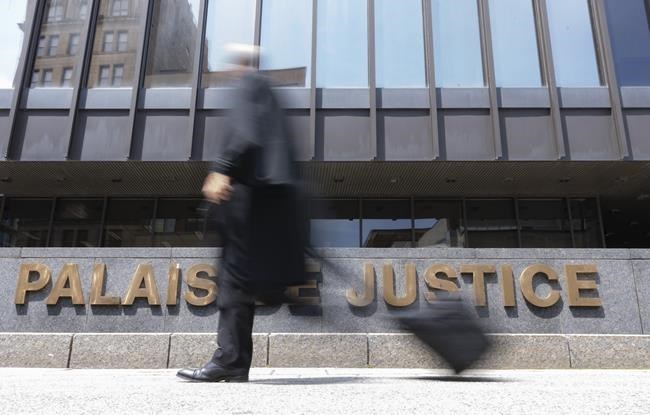MONTREAL — A police informant at the heart of a secret trial in Quebec is suing authorities for roughly $5.8 million, claiming that police and a prosecutor have undermined confidence in the system to protect collaborators.
The unnamed informant, described in the Aug. 28 lawsuit as the "designated person," accuses police officers of acting in bad faith by reneging on the co-operation deal and then allegedly blackmailing him or her.
"By acting in this way, the police service, the police officers involved and the prosecutor undermine confidence in the judicial system, undermine that of past, current and future police informants, and unfortunately, ultimately cause the regression of the effectiveness of their mission to stop crime," the lawsuit says.
Designated person and another plaintiff called X are suing the prosecutor, police force and three police officers for a combined total of at least $5.8 million in damages. The lawsuit, first reported by La Presse, is connected to a secret trial in which the informant was convicted of participating in a crime that he or she had revealed to police.
The existence of the secret trial only came to light because the informant appealed and the Court of Appeal in March 2022 set aside the conviction and wrote a decision that was highly critical of the secrecy surrounding the original trial.
Details of the trial were kept from the public, including the nature of the crime and where it allegedly took place, as well as the names of the judge, lawyers and the police force involved. It was not given a docket number.
According to the lawsuit, which has not been tested in court, designated person was recruited by authorities to become an informant because he or she was linked to a person of interest for police. The collaborator was paid for giving information to police, including about a crime in which the informant admitted involvement.
After initially ignoring the informant's crime, police began investigating it but did not tell the collaborator, the lawsuit says, adding that police knew that by inquiring about the crime, they were putting the informant's anonymity at risk.
Police then unilaterally put an end to the agreement with the informant – but met with him or her one last time to extract more details about the crime, the lawsuit says.
"To add insult to injury, the police force then forced (designated person) to make a grotesque choice: reveal their collaboration with the police by testifying in a public trial or face criminal charges themselves," the filing says.
The informant refused to testify publicly and police ultimately arrested him or her and charged them; the informant was found guilty. The charges were not made public.
The informant appealed and won. Quebec's Court of Appeal stayed the conviction and the legal proceedings, noting in its ruling the initial trial was "contrary to the fundamental principles that govern our justice system."
"This is a unique case in Canadian law, which goes well beyond the situation specific to (designated person)," the lawsuit says. "The alleged conduct is prejudicial to all police informants … everyone becomes at risk."
Quebec's justice minister has said that the province's prosecutors weren't involved in the case, suggesting that the informant was charged by federal lawyers. Asked for comment Monday, the Public Prosecution Service of Canada said it could not confirm or deny it was part of the original trial.
Lawyers representing the media, the province's attorney general and the chief judge of the provincial court sought a partial or complete release of the information in the secret case, but the Quebec Court of Appeal ruled in July 2022 that the right of informants to remain anonymous supersedes the principle of the open court process.
In March, the Supreme Court of Canada agreed to hear the media's appeal of that July 2022 decision.
Designated person is represented by Sebastian Pyzik and Charbel G. Abi-Saad of Woods, one of Canada's best-known law firms. The firm indicates it was not involved in the criminal side of the case. The lawyers said Monday they were unable to grant interviews.
This report by The Canadian Press was first published Sept. 11, 2023.
Sidhartha Banerjee, The Canadian Press

